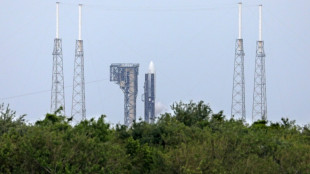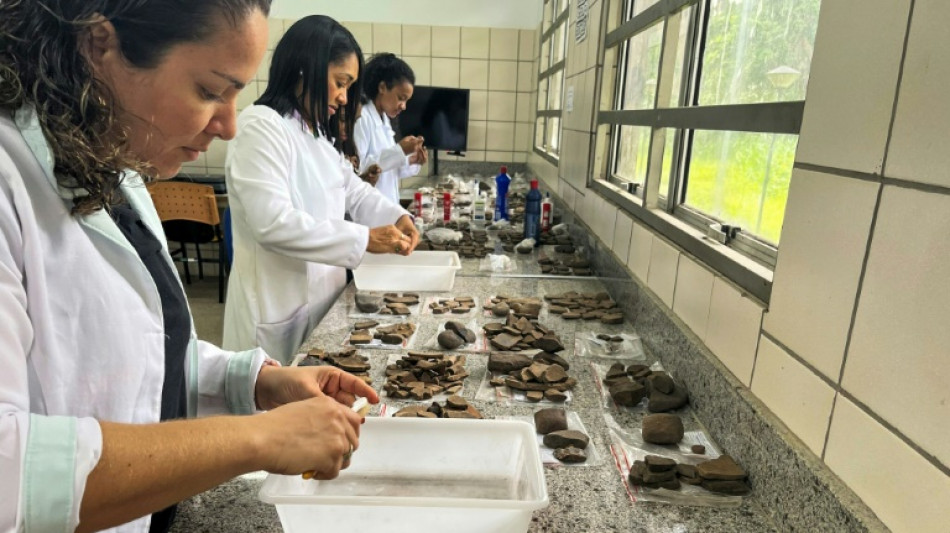
-
 Markets boosted as Trump softens tariff pain for auto firms
Markets boosted as Trump softens tariff pain for auto firms
-
Suryavanshi, 14, dubbed 'next superstar' after batting records tumble

-
 Australian doubles player Purcell accepts 18-month doping ban
Australian doubles player Purcell accepts 18-month doping ban
-
Kashmir attack unites political foes in India, Pakistan
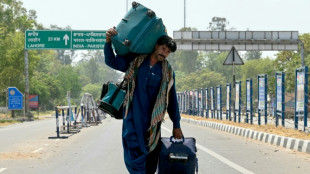
-
 Croatia hotel toasts dizzying century of stars, sovereigns and champagne
Croatia hotel toasts dizzying century of stars, sovereigns and champagne
-
Kenya's desperate need for more snake antivenom
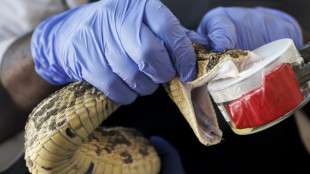
-
 Les Kiss in frame with Wallabies set to name new coach
Les Kiss in frame with Wallabies set to name new coach
-
Cavaliers scorch Heat, Warriors down Rockets in thriller

-
 Opposition wins Trinidad and Tobago election, returning Persad-Bissessar as PM
Opposition wins Trinidad and Tobago election, returning Persad-Bissessar as PM
-
Study sheds light on origin of Australia's odd echidna

-
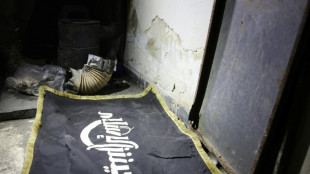 France tries Syrian Islamist rebel ex-spokesman on war crime charges
France tries Syrian Islamist rebel ex-spokesman on war crime charges
-
Trump boasts of 'fun' 100 days, but Americans disenchanted

-
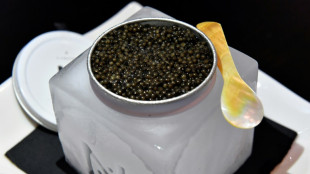 Elitist no more, caviar is turning casual
Elitist no more, caviar is turning casual
-
Amnesty accuses Israel of 'live-streamed genocide' against Gaza Palestinians

-
 Inter slump puts season at risk ahead of daunting Barca trip
Inter slump puts season at risk ahead of daunting Barca trip
-
Power returns to most of Spain, Portugal after massive blackout

-
 'I have hope': Vietnam Babylift survivor's search for birth mother
'I have hope': Vietnam Babylift survivor's search for birth mother
-
US climate assessment thrown into doubt as Trump dismisses authors

-
 Venezuelan president slams US over little girl's 'abduction'
Venezuelan president slams US over little girl's 'abduction'
-
Hard-right upstarts eye big gains in local UK polls

-
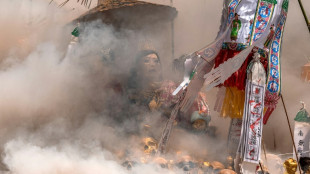 Skulls, smoke and spirits: Thai ceremony for the unclaimed dead
Skulls, smoke and spirits: Thai ceremony for the unclaimed dead
-
Canada's Carney: political newcomer who says he's best in a crisis

-
 Cavaliers scorch Heat to seal series sweep
Cavaliers scorch Heat to seal series sweep
-
Dead salmon create election stink on Australian island
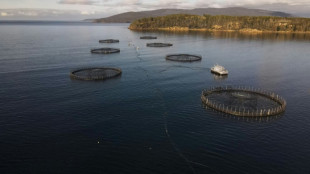
-
 Mic check: Singapore's podcast boom amplifies opposition voices
Mic check: Singapore's podcast boom amplifies opposition voices
-
Markets rise as traders gear up for earnings, key jobs data

-
 Congress passes 'revenge porn' ban, sending it to Trump
Congress passes 'revenge porn' ban, sending it to Trump
-
Spain and Portugal work to restore power after massive blackout

-
 Less-thirsty rice offers hope in drought-stricken Chile
Less-thirsty rice offers hope in drought-stricken Chile
-
Yamal stardust could give Barca edge on Inter Milan

-
 Coca-Cola Europacific Partners plc Announces Q1 Trading Update & Interim Dividend Declaration
Coca-Cola Europacific Partners plc Announces Q1 Trading Update & Interim Dividend Declaration
-
Trump targets US 'sanctuary cities' in migrant crackdown

-
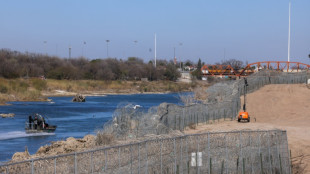 Mexico agrees to send water to US after Trump threatens tariffs
Mexico agrees to send water to US after Trump threatens tariffs
-
Amazon launches first Starlink-rival internet satellites
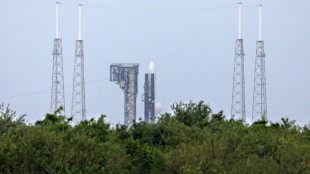
-
 US lost seven multi-million-dollar drones in Yemen area since March
US lost seven multi-million-dollar drones in Yemen area since March
-
Bucks blow as Lillard suffers torn Achilles: team

-
 Putin orders three-day truce amid new US warnings
Putin orders three-day truce amid new US warnings
-
Real Madrid's Ancelotti agrees Brazil deal - reports

-
 ChatGPT adds shopping help, intensifying Google rivalry
ChatGPT adds shopping help, intensifying Google rivalry
-
Global stocks mixed amid trade hopes as markets await tech earnings

-
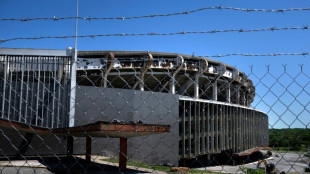 Commanders heading back to D.C. after inking $3.7 bln stadium deal
Commanders heading back to D.C. after inking $3.7 bln stadium deal
-
US warplane falls off aircraft carrier into Red Sea

-
 Feisty Arteta urges Arsenal fans to 'bring boots' to PSG Champions League clash
Feisty Arteta urges Arsenal fans to 'bring boots' to PSG Champions League clash
-
Bucks blow as Lillard suffers ruptured Achilles: reports

-
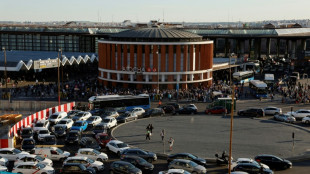 No power, no phone, no transport -- Spain in a panic
No power, no phone, no transport -- Spain in a panic
-
US warplane went overboard into Red Sea: Navy

-
 'Like a dream' as IPL's 14-year-old Suryavanshi becomes youngest to hit T20 ton
'Like a dream' as IPL's 14-year-old Suryavanshi becomes youngest to hit T20 ton
-
Luis Enrique says PSG have improved since October Arsenal loss

-
 UN food, refugee agencies warn of huge cuts after funding losses
UN food, refugee agencies warn of huge cuts after funding losses
-
Trump trade war dominates BRICS meeting in Brazil


Massive trove of ancient artifacts, skeletons found in Brazil
Workers were just starting construction on a new apartment complex in northeastern Brazil when they began finding human bones and pottery shards, their edges worn smooth by time.
Soon, excavations at the site in the coastal city of Sao Luis had uncovered thousands of artifacts left by ancient peoples up to 9,000 years ago -- a treasure trove archaeologists say could rewrite the history of human settlement in Brazil.
The lead archaeologist on the dig, Wellington Lage, says he had no idea what he was getting into when Brazilian construction giant MRV hired his company, W Lage Arqueologia, in 2019 to carry out an impact study at the site -- part of the routine procedure of preparing to build an apartment building.
Covered in tropical vegetation and bordered by the urban sprawl of Sao Luis, the capital of Maranhao state, the six-hectare (15-acre) plot was known as Rosane's Farm, for the daughter of a late local landholder.
Researching the site, Lage learned intriguing vestiges had been found in the area since the 1970s, including part of a human jawbone in 1991.
His team soon found much more: a flood of stone tools, ceramic shards, decorated shells and bones.
In four years of digging, they have unearthed 43 human skeletons and more than 100,000 artifacts, according to Brazil's Institute for National Historic and Artistic Heritage (IPHAN), which announced the discovery this week, calling it "grandiose."
Researchers now plan to catalogue the artifacts, analyze them in detail, put them on display and publish their findings.
"We've been working four years now, and we've barely scratched the surface," said Lage, a 70-year-old Sao Paulo native whose wife and two children are also archaeologists.
- Rewriting history -
The preliminary findings are already grabbing attention in the scientific community.
Lage says his team -- which grew to 27 people in all, including archaeologists, chemists, a historian and a documentary filmmaker -- has found four distinct eras of occupation at the site.
The top layer was left by the Tupinamba people, who inhabited the region when European colonizers founded Sao Luis in 1612.
Then comes a layer of artifacts typical of Amazon rainforest peoples, followed by a "sambaqui": a mound of pottery, shells and bones used by some Indigenous groups to build their homes or bury their dead.
Beneath that, around two meters (6.5 feet) below the surface, lies another layer, left by a group that made rudimentary ceramics and lived around 8,000 to 9,000 years ago, based on the depth of the find.
That is far older than the oldest documented "pre-sambaqui" settlement found so far in the region, which dates to 6,600 years ago, Lage said.
"This could completely change the history of not just the region but all of Brazil," he told AFP.
Scientists have long debated exactly when and how humans arrived in and populated the Americas from Asia.
Lage's find suggests they settled this region of modern-day Brazil at least 1,400 years earlier than previously thought.
- 'Landmark' -
Archaeologists now plan to date the artifacts more precisely using isotopic analysis.
Already, the site "represents a landmark in our understanding of prehistoric Brazil," IPHAN said in a statement.
"It's a testament to the long history of human settlement (in the region), demonstrating it predates what had previously been recorded in Brazil."
Archaeologist Arkley Bandeira of the Federal University of Maranhao, which is building a lab and museum to house the artifacts with funding from MRV, said in a statement the site could provide valuable new insights into the culture and history of ancient peoples lost to the past.
"These finds... play a crucial role in narrating our long history," he said.
Y.Aukaiv--AMWN
